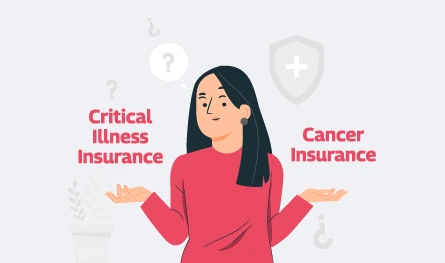Related Articles
 Jan 08, 2025
Jan 08, 2025
Is Varicose Vein surgery covered under the health insurance policy in India
 Health Insurance
Health Insurance

Cancer is the deadliest disease against which everyone needs protection. Looking at the gravity of the disease, people tend to buy as much health insurance protection as possible against cancer. However, how do you choose between a cancer insurance policy and a critical illness insurance plan covering different types of cancers? Which plan would suit your maximum coverage needs better? Let’s understand the two plans to make an informed decision.

Critical illness plans are health insurance policies especially crafted to cover the expenses of critical diseases, which are generally not covered under regular health insurance plans. These policies are designed to overcome the limitations of traditional health policies and to allow comprehensive coverage to the policyholders.
The key purpose of critical illness coverage is to support the insured in paying for the expensive healthcare treatments of certain critical diseases.
Critical illness covers have many advantages. However, when you talk about assessing them in terms of their usefulness in covering Cancer and its treatment, the plans may not suit much.
The cancer insurance plans are designed to address the shortcomings of critical illness insurance plansThese dedicated plans offer cancer care treatment and can be termed as a special critical illness policy.
Most of these cancer-specific plans allow coverage for an entire range of expenses associated with cancer diagnosis and treatment. Such policies offer coverage for chemo and radiation therapy, surgery, as well as hospitalization costs.
Most of these cancer health insurance policies offer comprehensive cancer coverage, including most cancer types in the early and advanced stages. Below are some common cancer types included under these insurance plans:
Under a cancer insurance policy, the insured can raise a claim to receive a payout at minor and major stages of the disease.
Below are the conditions in which treatment expenses are excluded under cancer insurance plans:
Here’s how the cancer insurance plans work:
| Feature | Details |
|---|---|
| Eligibility | Minimum entry age – 18 years Maximum entry age – 65 years The policy can be renewed once the policyholder crosses 65 years of age (defers as per policy) |
| Sum insured | Minimum – INR five lakhs Maximum – INR 50 lakhs |
| Premium waiver benefit | Some insurers offer a premium waiver benefit If the claim of an insured is approved under an advanced stage of the disease, all future premiums are waived off You can receive such benefits only if the policyholder is regular in paying premiums and the policy is active |
| Affordability | These plans are reasonable compared to the benefits they offer |
| Tax benefits | Premiums paid towards these plans qualify for tax exemptions u/s 80D of the Income Tax Act |
Yes, Cancer is covered in many health insurance policies offering coverage for critical illnesses. There are many cancer-specific plans too.
Some of the best cancer insurance plans are:
~ Care Cancer Mediclaim Plan
~ Chola MS Critical Healthline Insurance Plan
~ Aditya Birla Activ Secure – Cancer Secure
~ Max Life Cancer Insurance Plan etc.
In most cases, Cancer is covered under the critical illness plans. They may or may not cover all types of cancers under such policies and at different stages. However, a cancer insurance plan is designed to cover the threats of Cancer starting from the stage of diagnosis with the disease.

Paybima Team
Paybima is an Indian insurance aggregator on a mission to make insurance simple for people. Paybima is the Digital arm of the already established and trusted Mahindra Insurance Brokers Ltd., a reputed name in the insurance broking industry with 17 years of experience. Paybima promises you the easy-to-access online platform to buy insurance policies, and also extend their unrelented assistance with all your policy related queries and services.
.png)
Arjun has a car that is four years old and most of the parts are performing well. However, the engine started showing some issues and he immediately went to a nearby auto repair shop to get the problem checked. The mechanic clarified that the engine required replacement. As Arjun has a car insurance policy, the insurance company paid the expenses that saved a lot of money.

.png)
The thrill of purchasing your first bike is exhilarating. However, before the engine roars and you begin your journey to the open roads that await, do acquaint yourself with the bike insurance-related jargon. Especially while buying the bike insurance plan online, you should be clear about who is a first, a second, or a third party in insurance. This is dissimilar to the first-party or third-party bike insurance policies offered by insurance companies in India.

.png)
Anyone willing to ride/operate a two-wheeler on the highways in India must acquire a driving license. There are several types of driving licenses for different types of vehicles in India. MCWG is one such type of driving license that allows individuals to legally and freely ride two-wheelers, including heavy two-wheelers, on Indian roads.

.png)
Bringing home a new vehicle is a matter of great joy and excitement for the whole family. But this joy comes with the trouble of undergoing various procedures to get the vehicle registration done by the authorities. You can put yourself in legal trouble by driving your new vehicle without the RC or the Registration Certificate.

.png)
Wondering about what is Taxi insurance ? It is a highly specific type of insurance that offers coverage for owners of taxis, who are an indispensable part of our public transportation ecosystem throughout the country. Here’s learning more about the same.
